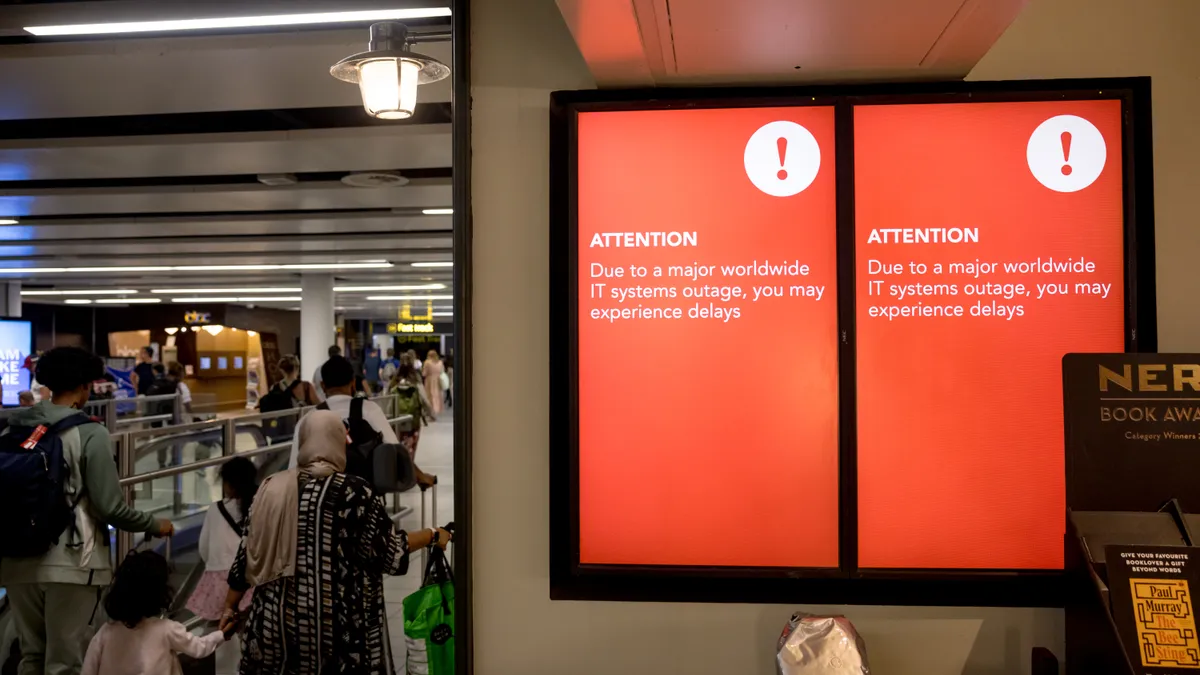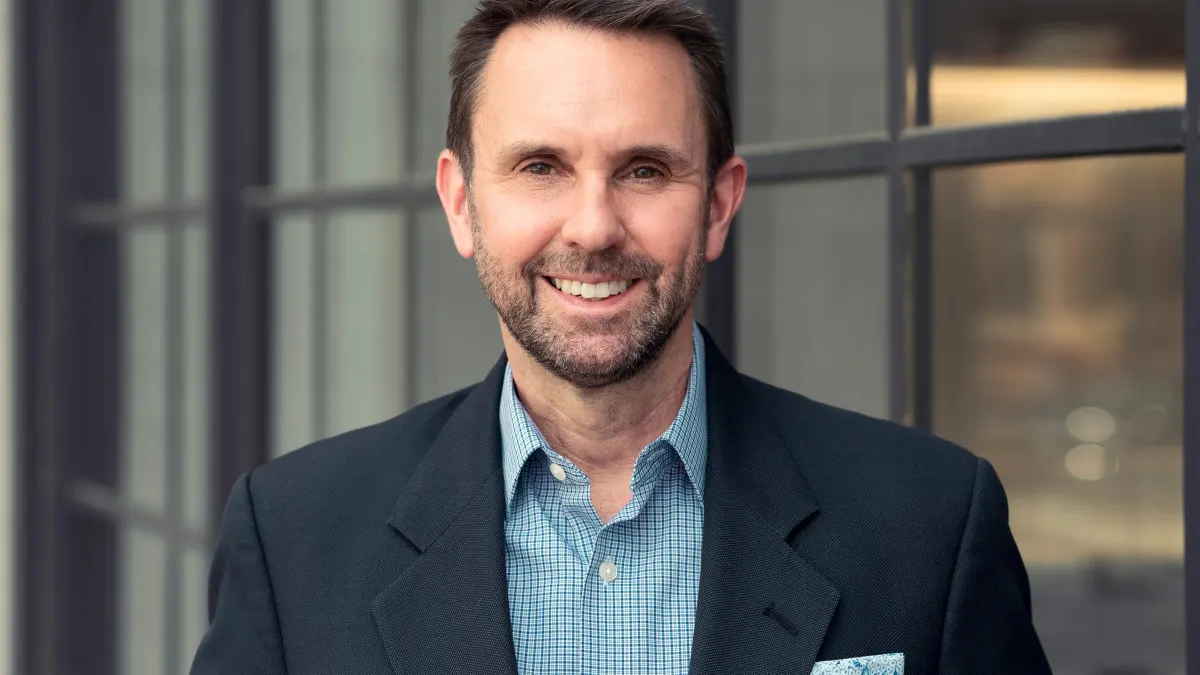If the theme for businesses in 2020 was survival, in 2021 companies took timid steps toward executing transformation goals. But next year, the gloves are off: Organizations are working to capitalize on more than 18 months of pandemic insights to level up their businesses.
Speakers during the Gartner IT Symposium/Xpo last week laid out where they envision leaders moving towards, the tools IT will most rely on, and what organizations expect of them. The shifts in consumer patterns and regulation mean there's ample opportunity to take bold risks within the enterprise.
Last week, CIO Dive heard about tech-enabled hybrid models, IT leaders with a passion for novelty, a reimagined company structure and the link between engineering and better inclusion efforts. But certain remarks from analysts and experts left an impact well after the closing keynotes.
Here are eight big-picture comments from the Symposium to know:
Christie Struckman, VP analyst at Gartner
Struckman broke down why it's important to convey digital priorities to the organization, and which tool can help:
"Organizations are two times more likely to realize their digital ambitions when there is a good and robust understanding of the digital strategy among the organization. So we have to create an understanding of that.
The tool that we recommend for this is called a digital business narrative, and that digital business narrative is what explains to the organization what it is that we're trying to achieve."
Sheila Jordan, chief digital technology officer, Honeywell
Jordan discussed what's different now at Honeywell compared to 18 months ago, during a CIO panel hosted by the Wall Street Journal's Steven Rosenbush, bureau chief, enterprise technology:
"We had a pretty accelerated digital transformation agenda so even when the pandemic occurred, Honeywell was super proactive about making sure that we kept the pace.
But I will say what's interesting, what's different is you're now having every single person in the organization, including executives, use the technology. And when they're using the technology they're being allowed to see and visualize and actually experience how we might apply this technology in different venues and different activities.
So actually, something that the pandemic has really helped executives, it's not a PowerPoint presentation or it's not the IT person coming in and pitching an idea — [executives are] actually in the experience themselves, and where they're doing that, we're able to apply that to other ideas and other alternatives."
Apoorva Chhabra, principal analyst at Gartner
Among the traits of a leading tech executive, Chhabra explained being a geek is one badge to wear proudly:
"Being a geek brings you closer to knowing what your business is built on. It brings you closer to the reality of understanding the technology that your business is actually built on.
So if you're someone who on a Saturday morning likes to sit there, [drink] tea, and read about the latest tech, you always are the first to know about what are the latest gadgets and technologies in the market, there is a reason to celebrate, because you are a geek."
Michael Kingston, chief information officer, L'Oreal Americas
Kingston, speaking alongside other CIOs during the Gartner panel, discussed what was different for him in the pandemic as a CIO:
"Empathy became the No. 1 leadership quality for all of us because we really needed to stay very close and very connected to our teams, so that we could keep people, you know, motivated and working and moving in the right direction.
For me, that's probably one of the biggest takeaways from the last 18 months is the need for us, not only as technologists, but as leaders of people to stay very, very closely connected to our teams and to our peers."
Daryl Plummer, distinguished research vice president and fellow at Gartner:
By 2025, Gartner predicts businesses can avoid 70% of privacy violations by using synthetic data to supplement personal data collection. The use of AI-created data has the added benefit of giving privacy efforts a boost, Plummer said.
"If you want people to think good about your company, you should actually start by not invading their privacy. When you use artificial intelligence this way, you can get a boost, and when you get that boost you're able to model things without those personal specifics, and to do it at a rate and in a complexity that human beings would never have thought of."
Abhi Dhar, EVP, chief information and technology officer, TransUnion
Dhar spoke with Rosenbush and other panelists about changes to what he's called on to do:
"The one thing to contemplate in this particular scenario is that the cause of a lot of this change is the fact that technology is being adopted by consumers at unprecedented rates. And what that causes is a rate of change in really human society, which is … caused by consumers adopting technology and it's very unfamiliar.
So folks are reaching out to us and saying hey, what do you think about this industry, if they were suddenly all over the cloud, what happens if national institutions are disaggregated by APIs and how might we be able to respond to that opportunity or mitigate the threat it presents.
We are no longer experts in driving and enabling business but really being called upon to say what happens next from a business point of view, what happens next from a consumer experience point of view."
Chris Howard, VP and chief of research, Gartner Research
Speaking with executive leaders across industries, Howard and others at Gartner see the rate of change in business technology and strategy accelerating:
"Things are definitely moving faster. What happened was the digital, it was a means of survival. And now it's become the business and everybody realizes that.
What that has done at the highest levels of the organization, what I see is, created both permission and expectation, is how you would put it.
So there's permission to be bold, to innovate in more aggressive ways, but there's also an expectation that you'll do it."
Graham Waller, distinguished research vice president at Gartner
In laying out a long-term hybrid work strategy, some executives fear flexibility can impact results.
"Some of you, or your CEOs or CFOs, may be thinking: 'we can't afford to overly pander to employees' desire for flexibility, if it's going to sacrifice productivity.
I've got some good news for you: A well-designed and well implemented hybrid program, drive both talent and business outcomes."
























